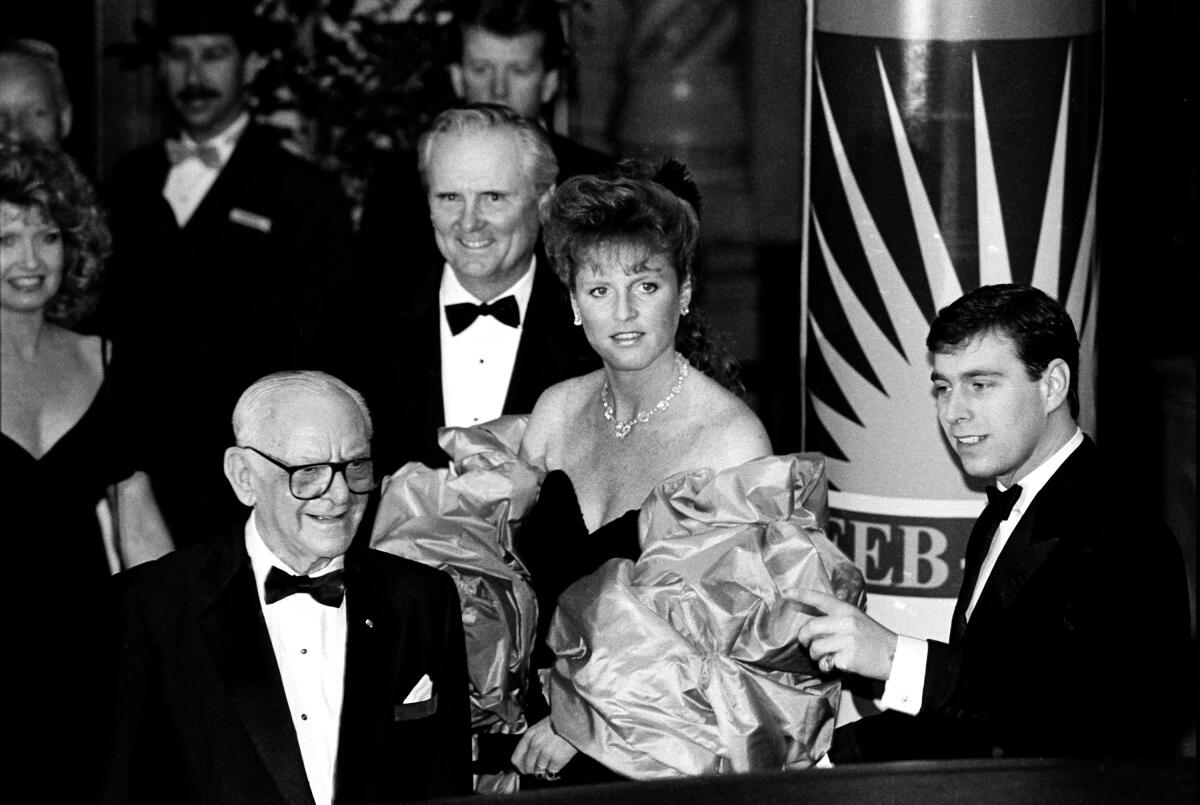Lodwrick Cook, epitome of L.A.’s bygone era of corporate engagement, dies

- Share via
From his office on the 51st floor of the gleaming black building at Flower and 5th streets, Lodwrick M. “Lod” Cook watched below as smoke enveloped the iconic pyramid crowning the Los Angeles Central Library.
For the chairman and chief executive of Arco, the April 29, 1986, arsonist’s fire that heavily damaged the quirky and beloved architectural landmark was not just a tragedy. It was a call to action that would engage Cook for years.
Arco, then a leader among the dwindling ranks of corporate giants headquartered in Los Angeles, immediately provided space in its twin towers for displaced library staff, and Cook joined then-Mayor Tom Bradley in leading Save the Books, a campaign to raise money for the library’s restoration.
He set up a store in Arco Plaza to benefit the library, dispatched Arco employees to the massive effort to restore hundreds of thousands of damaged books and periodicals and leaned on friends and other executives to contribute. Over two years, the effort raised more than $10 million.
Such was Cook’s commitment to the library project that in one of the zaniest of charity telethons in L.A. history, he donned cowboy boots and a hat and danced to “Just a Gigolo.” For the next half-hour, calls poured in from around the country, bringing in $100,000.
L.A. knows how to put on a variety show.
He later told The Times’ Nita Lelyveld that a friend called in offering $1,000 if he would stop dancing.
Cook, whose 1995 retirement as Arco’s CEO presaged the end of an L.A. era of corporate philanthropy and civic engagement, died Sept. 28 in Sherman Oaks. He was 92.
The death of the Louisiana native and Louisiana State University graduate was confirmed by the New Orleans Times-Picayune.
Cook spent 39 years at Arco, starting in 1956 as a management trainee. As CEO, he carried on the tradition of civic leadership established by his predecessor Robert O. Anderson. In a 1999 essay, UCLA political scientist Xandra Kayden wrote that Arco, more than a leading oil company on the West Coast, was a leading citizen. “It consciously defined ‘corporate citizenship’ for many U.S. companies, and many U.S. communities, as well.”
Zev Yaroslavsky, who was a councilman and county supervisor during Cook’s years in L.A., remembered him as a folksy man from the Deep South with an uncommon devotion to civic betterment.
“He was a throwback to the old way where you had a couple of dozen companies and corporations whose leaders, when the mayor or governor had to get some heft behind a civic project, that’s who they would turn to,” Yaroslavsky said. “Lod was one of them.”
Among its works were the Dome Village for the Homeless, the building named for Anderson at the Los Angeles County Museum of Art, and Arco Plaza at the Museum of Contemporary Art.
More important, the company’s diligence in evaluating applications made an Arco’s grant a “good philanthropist’s stamp of approval” that gave credibility to new groups and initiatives, Kayden said.
It was a time, Cook said in a 2005 interview, when a small group of corporate leaders met occasionally to discuss the city’s needs.
“I wish Arco was still here,” he told Lelyveld. “Now we’ve lost a lot of our corporate headquarters, and that’s a sad thing, because you don’t have that push.”
The Central Library in downtown Los Angeles.
When the expanded library opened in 1993, the rotunda was named for Cook, who also helped create and was the first chairman of the Library Foundation of Los Angeles, which now raises private donations.
He was also a chairman of the Ronald Reagan Presidential Foundation and a board member and trustee of the George Bush Presidential Library Foundation.
After the 1992 riots, he served as a chairman of Rebuild L.A.
Cook graduated from high school in Grand Cane, La., in a class of just five students. He earned bachelor’s degrees from Louisiana State University in mathematics and engineering. He had a business degree from Southern Methodist University.
After retiring from Arco, Cook became co-chairman of Global Crossing, which built a global fiber-optic telecommunications network, and most recently was chairman of NeuroSigma Inc., a medical device maker.
Cook’s wife of 35 years, Carole died in 2010. He is survived by five children, and 10 grandchildren.
More to Read
Start your day right
Sign up for Essential California for the L.A. Times biggest news, features and recommendations in your inbox six days a week.
You may occasionally receive promotional content from the Los Angeles Times.









